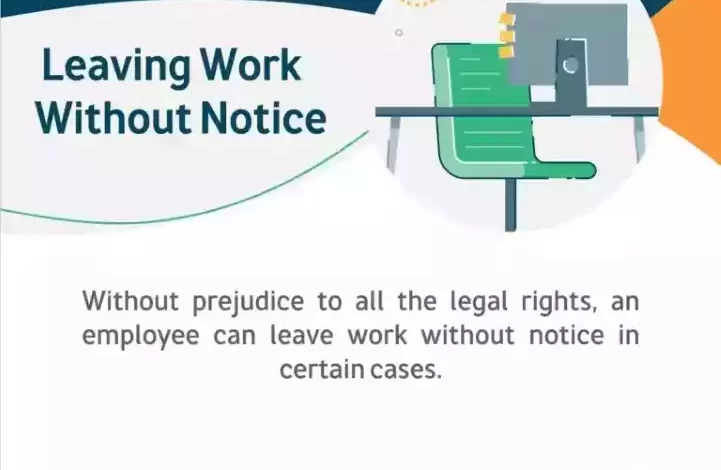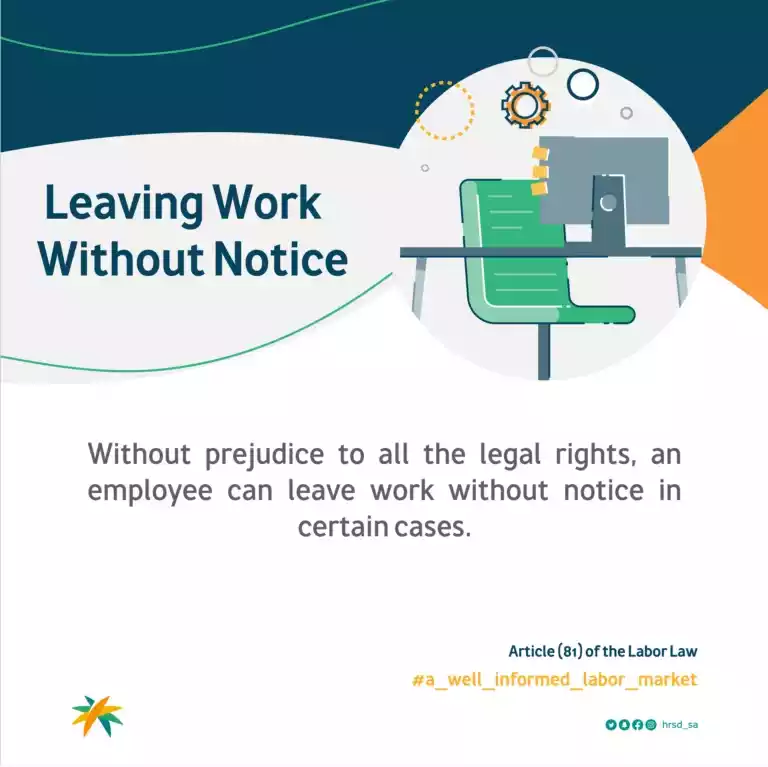When is it permissible for an employee to leave a job without giving notice?

Understanding Workers Right to Leave Without Giving Notice
Both the employer and the employee have obligations and rights that must be followed in any working arrangement. They are often described by the appropriate laws and regulations or in the employment contract.
While it is customary for employees to give notice before leaving their jobs, there are several instances in which this is not required.
In this article, we’ll examine the circumstances in which an employee might quit their job without giving notice and what that means for the employee and the company.
Flight attendant lists 7 plane toilet mistakes
In some circumstances, employees may terminate their employment contracts without giving prior notice under certain articles of Saudi Arabia’s labour law.
These clauses are intended to safeguard the worker from instances of unfair treatment, abuse, or dangerous working circumstances. Let’s examine each of these circumstances in more detail.
failure to perform important duties
If the employer breaches any material contractual or legal responsibilities to the employee, the employee may terminate their employment without giving notice.
The employee may sever their relationship with the employer without giving notice, for instance, if the employer underpays the employee’s income or compensation or fails to offer the agreed-upon perks.
The employee may terminate employment without giving notice if the employer or their agent engaged in fraud misrepresenting the nature and circumstances of the employment at the time of contracting.
The employee may end the contract without giving notice if, for instance, the employer misrepresented the job description, the number of hours worked, or other contract terms and conditions.
The employee has the right to leave immediately if the employer assigns them, without their consent, to conduct work that is fundamentally different from the labour that was originally agreed upon and in contravention of the terms of Article (60) of the Labour Code.
This clause guards against forcing workers to carry out tasks that are dangerous to them or outside the scope of their training or experience.
Credit Relationship Manager Vacancy | HDB Financial Services | TN JOB ACADEMY
Violence or immoral behaviour
The employee is free to quit immediately if the employer, a member of their family, or the manager in charge engages in a violent assault or another immoral act against them or any of their family members.
This covers any abusive behaviour, such as physical or sexual assault, that endangers the victim or their loved ones.

injustice, cruelty, or insult
The employee has the right to leave immediately if they feel that they have been treated cruelly, unfairly, or insultingly by the company or the management in charge.
Employees are protected from unfair treatment and harassment under this clause, including bullying, discrimination, and offensive conduct.
significant risk to one’s health and safety
The employee has the right to leave without giving notice if there is a substantial risk to their health or safety at work, provided that the employer is aware of it but does not take action to remove it.
Employees are protected from being subjected to hazardous or unhealthy working conditions that could endanger their health or safety.
9 Tips from Taqa (To Stay) – Campaign to Save Fuel While Driving | Gulf Insights
Unfair treatment or breach of contract obligations
The employee may leave without giving notice if the employer or their representative has made it look as though they are ending the contract by their conduct, particularly through unfair treatment or violating the provisions of the contract.
This clause guards against false accusations of contract violations and holding employees accountable for the end of the employment relationship.
Conclusion
Employees may be allowed to quit their jobs in certain circumstances without giving their employer notice. These circumstances take place when the employer disregarded significant legal or contractual commitments, violated the employee’s rights, or both.
The employee may be permitted to quit their job without giving notice, for instance, if the employer treated them cruelly or unfairly, or if they were forced to work in an unsafe setting.
The employee may also be permitted to quit without giving notice if the employer has seriously broken the terms of the contract. Employees must be aware of their rights in these circumstances and should seek legal counsel if they are unclear.
Also, employers must make sure they are treating their staff members properly and abiding by all legal requirements and contractual commitments.



